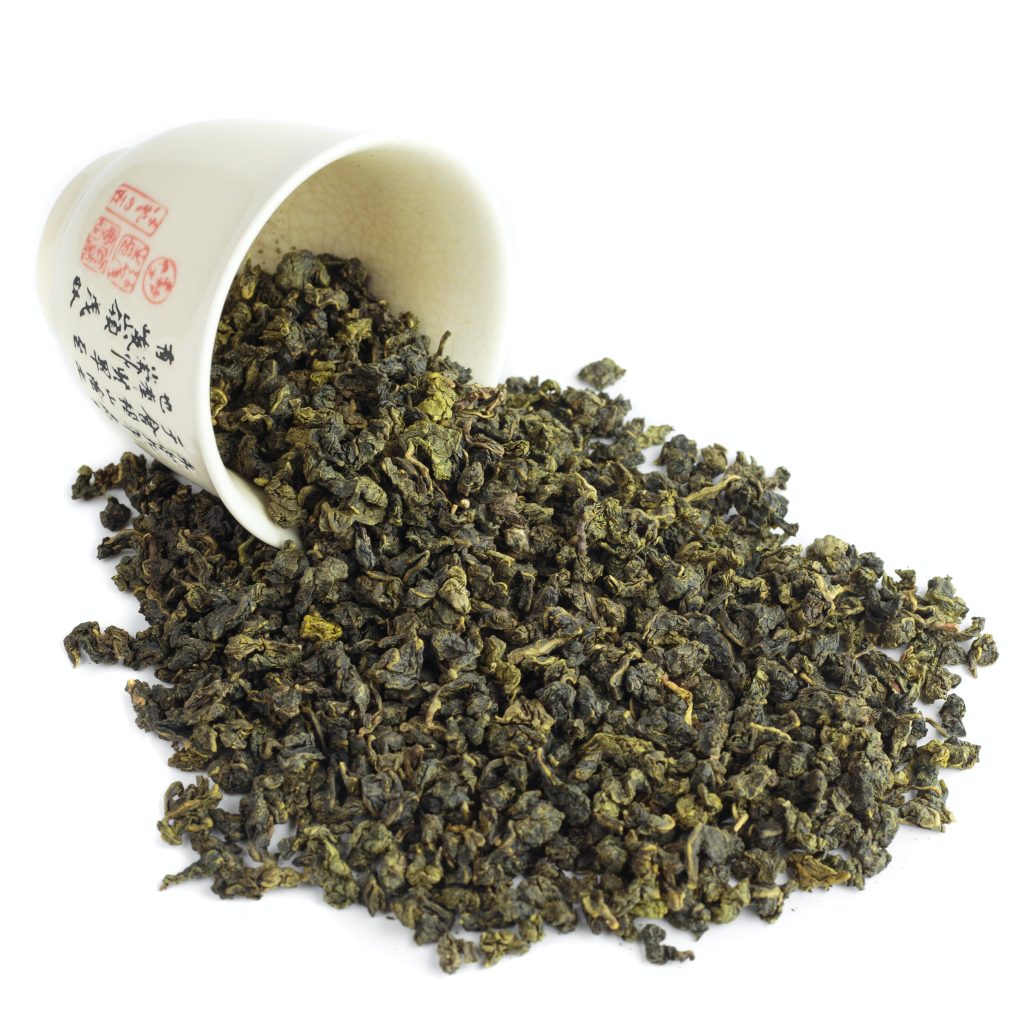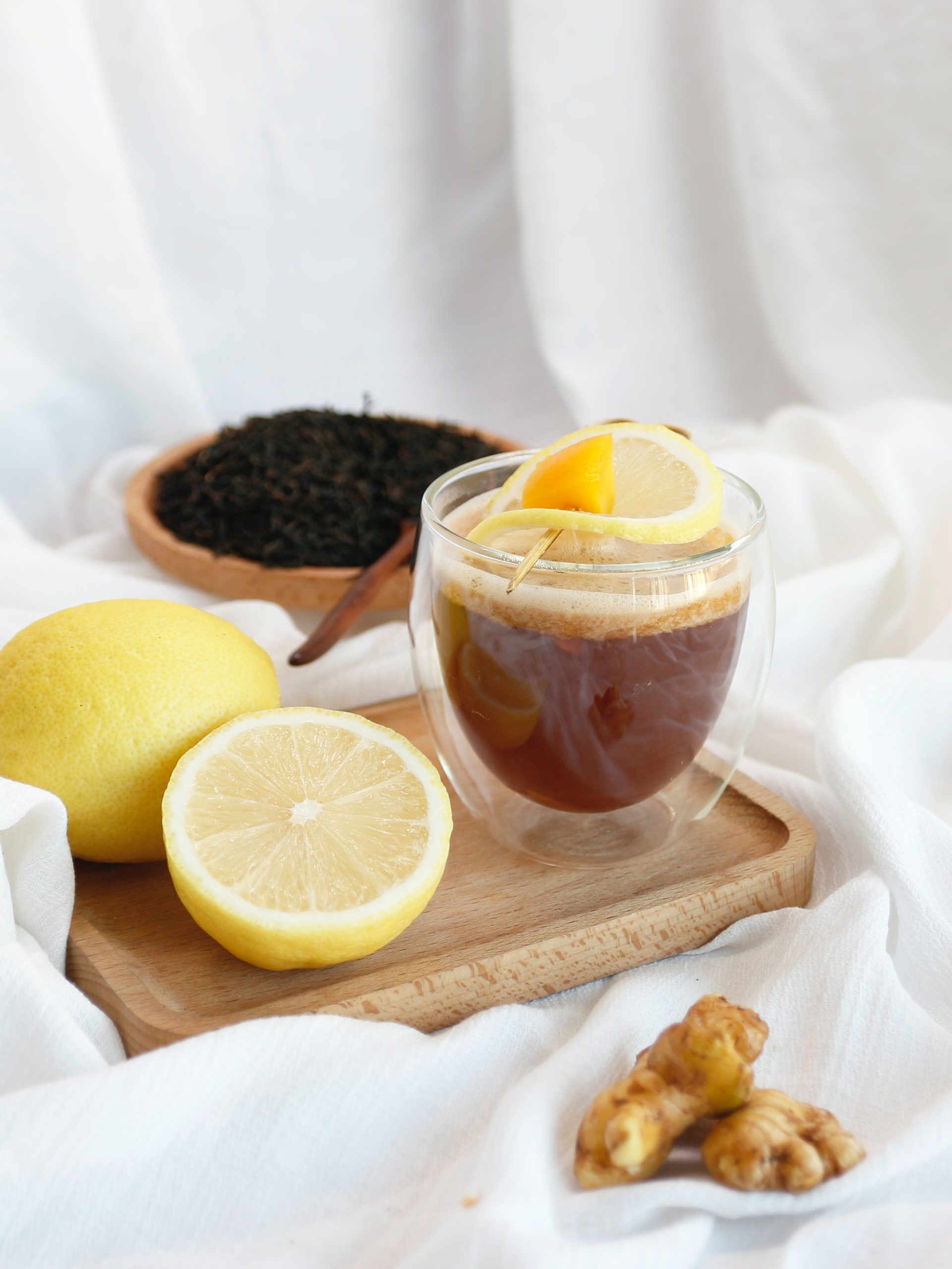
Photo by petr sidorov on Unsplash
Oolong tea benefits have been appreciated for many years in China, and this tea – which is also known as Wulong, Wu Long, or Black Dragon tea – is becoming a favourite with countless other tea lovers around the world, as well, thanks to its enticing flavour and many wellness benefits.
If you’ve considered adding oolong to your tea stash, your taste buds will love this special tea and its delicately soft yet complex taste.
Oolong tea (like black, green, pu-erh, and white teas) comes from the leaves of the Camellia sinensis tea plant. Oolong, green, and black teas all originate from the same plant, the Camellia sinensis plant, highlighting that these popular teas are made from the same plant species. What sets oolong apart is its partial oxidation process; oolong tea is partially oxidized, meaning the tea leaves undergo controlled oxidation that falls between that of green and black teas. Because oolong can be oxidized anywhere between 8% and 85%, the flavour can vary from one oolong tea to another. Compared to black and green tea, oolong shares some similarities in health benefits and antioxidant content, but the unique processing method gives it a distinct flavor profile. Black and green teas are also widely consumed and valued for their health properties, but oolong’s partial oxidation offers a balance between the two.
You + Oolong Tea
We’d love to hear what you think of oolong tea and its benefits for wellness!
Share your oolong tea story here and see what others say about this delicious tea, too.
drink oolong tea’s intoxicating flavour and delightful aroma aren’t the only reasons to try this healthful tea – you’ll also love oolong tea’s benefits for wellness, including…
- Like other teas from the Camellia sinensis tea plant, oolong tea is an excellent source of powerful antioxidants. Antioxidants can support and aid us in many ways, from fighting harmful free radicals, strengthening the immune system, and boosting metabolism to helping protect us from chronic diseases. (such as diabetes and heart disease). Oolong tea is known for its strong antioxidant activity, which helps neutralize free radicals and prevent disease. The antioxidant flavonoids found in oolong tea play a key role in protecting cells from damage and supporting the immune system. Additionally, oolong tea contains polyphenol antioxidants, which contribute to its health benefits, including immune support, cardiovascular protection, and cancer risk reduction. A diet rich in antioxidants is essential for good health, and adding oolong tea to your diet is a simple but very effective and enjoyable way to boost your daily antioxidant intake.
- Improve skin health and beauty with oolong tea. Life is filled with things that can age our skin prematurely, from stress and environmental toxins to free radicals and poor habits (unhealthy food choices, smoking, and so on). Fortunately, oolong’s potent antioxidants also work to keep those signs of ageing at bay, helping skin look and feel younger, firmer, and more supple. Oolong tea also possesses anti allergenic properties, which may help reduce symptoms related to allergies and support healthier skin. An additional bonus is that drinking tea is as effective as drinking water in keeping our bodies well-hydrated (also important for skin beauty and wellness).
| Related: Green Tea Skin Benefits
- Oolong tea may also prove beneficial for skin irritations, such as eczema. Research suggests that drinking oolong tea regularly may reduce the symptoms and ease the itch of eczema, and these benefits can be long-lasting. In one study, participants with eczema enjoyed 1 1/2 cups of oolong three times per day for six months, and after one month, over 60% experienced marked improvement in their skin condition. After six months, over half of the participants reported continued benefits for their eczema.
Overall, the health benefits of oolong tea make it a valuable addition to your routine for supporting human health.
Brew a Cup to enjoy Oolong Tea Benefits

Photo by An Nguyen on Unsplash
Now that you know more about oolong tea’s benefits, you’re likely ready to get brewing! To ensure your cup of oolong provides you with the most beneficial antioxidants, steep it for about 3 minutes in boiling water (100c) to extract optimal flavor and health compounds. Oolong tea is made from fresh tea leaves that are partially oxidized, a process that influences both its unique flavor and its health benefits. Get more tips here for making the perfect cup of tea, or discover the benefits of lemongrass tea as another healthy and flavorful option.
- Take advantage of the caffeine benefits of oolong tea. So many of us love our caffeine and with good reason… Low to moderate amounts of caffeine may help us fight chronic inflammation, promote longevity, boost metabolism, and increase energy, alertness, and concentration – and much more. A delicious, natural way to enjoy low levels of caffeine is by drinking naturally caffeinated oolong tea.
- Enhance bone strength and density with oolong tea. As we age, we can lose bone mass, and our bones become thinner and weaker. However, drinking oolong, green, and/or black tea regularly is a step we can take that may improve bone strength and lessen the risk of a fracture. Studies indicate that tea drinkers who have consumed tea regularly (at least once per week) for six years or more have stronger BMD (bone mineral density) than non-habitual tea drinkers. Drinking tea regularly for more than ten years provides even greater improvement in overall BMD.
| Related: Tea and Aging
- Enjoy oolong tea for healthy brain function now – and in later life. Not only can that cup of oolong enhance focus, alertness, and a feeling of calm almost immediately, but nurturing a tea habit now may benefit cognitive wellness in future years. Research has found that long-term, regular consumption of oolong, green, or black tea can improve brain function lessen the chance of cognitive decline with age, and also help to ward off degenerative diseases (such as Alzheimer’s).
Keep reading here to learn more about this healthy, delicious brew and discover more oolong tea benefits.
More Research about Oolong Tea Health Benefits

Current research targeting oolong tea’s health benefits supports ancient wisdom about this delicious, healing tea. As oolong tea becomes better known worldwide, its many health benefits will become the target of increasingly more research studies.
Even though oolong tea leaves’ health benefits have been treasured in China for centuries, oolong tea and its healing properties are still new to many of us.
As you get to know the delicious taste of oolong tea, know that you are enjoying the following: oolong tea also contains many health benefits. Oolong tea contains antioxidants, caffeine, and amino acids like L-theanine, which contribute to improved cognition, reduced inflammation, and cardiovascular health. More oolong tea information is available in current research focusing on the different varieties of oolong teas and their unique health benefits. Many high-quality oolong teas originate from the Fujian province in China.
Oolong Tea and Heart Health
A 2009 population study at Kyoto University in Japan involved almost 77,000 participants between the ages of 40 and 79, each with no history of stroke, coronary heart disease, or cancer at the onset of the study.
Research results indicated that regular oolong and/or green tea consumption can help reduce the threat of heart disease and may also provide broader benefits by lowering the risk of cardiovascular diseases. The study also found that oolong tea intake may help reduce the risk of coronary artery disease. Overall, regular consumption of these teas was associated with a lower risk of death from cardiovascular disease. Click here to read the research abstract.
Your Oolong Tea Benefits
What do you think of oolong tea? If you’ve experienced the benefits of oolong tea, we’d love to hear about it! Click here to share your thoughts and opinions about oolong tea with other visitors to our site.
Oolong Tea and Cholesterol
Oolong tea may also protect you from heart disease by helping to lower high cholesterol levels.
High LDL cholesterol levels can increase your risk of heart attack, and a 2003 study at the Institute for Health Care Science in Osaka, Japan, found that the antioxidants in oolong tea may lower high LDL levels.
If you’d like to take a closer look at the study, click here.
Oolong Tea Health Benefits for High Blood Pressure
This 2004 study of the long-term effects of not drinking green tea on high blood pressure showed that drinking oolong or green tea regularly can significantly lower your risk of developing high blood pressure.
In the study examining the tea-drinking habits of over 1500 participants in Taiwan, the risk of developing hypertension decreased by 46 per cent for habitual tea drinkers who consumed at least 120 ml (1/2 cup) oolong or green tea daily for at least one year. For those who drank over 600 ml (2 1/2 cups) of oolong or green tea each day, that risk was decreased by 65 percent.
Tea consumption for more than a year did not lead to additional risk reduction.
If you’d like to read more about this study, click here.
Oolong Tea and Type 2 Diabetes
Twenty participants with type 2 diabetes taking prescribed hyperglycemic medication participated in this 2003 study in Taiwan.
After consuming 1500 ml (about 6.3 cups) of Chinese oolong tea daily for 30 days, the study participants had significantly lower blood sugar levels. (Chinese, rather than Taiwanese, oolong tea was selected for the study because its shorter oxidation process typically results in higher levels of antioxidants in the tea.) In addition to antioxidants, certain compounds in oolong tea, such as polyphenols, may affect iron absorption in the body by binding to iron and potentially reducing its uptake.
More oolong tea health benefits... The study also found that consuming oolong tea combined with hyperglycemic medication was more effective in lowering blood sugar levels than alone.
Interested in reading more? Click here to read the research abstract, or click here if you would rather see the full journal article.
Oolong tea may also support the health of the digestive tract by promoting a healthy gut environment.
Oolong Tea and Brain Health
Oolong tea isn’t just a treat for your taste buds—it’s also a smart choice for your mind. Thanks to its unique blend of caffeine and the amino acid L-theanine, drinking oolong tea can help boost mental alertness and support cognitive function. The moderate caffeine content in oolong tea provides a gentle lift in energy and focus, without the jitters that sometimes come with stronger black teas or coffee. Meanwhile, L-theanine works in harmony with caffeine to promote relaxation and enhance concentration, helping tea drinkers stay calm yet attentive throughout the day.
But the benefits of oolong tea for brain health don’t stop there. Oolong tea is rich in antioxidant flavonoids, which may help protect the brain from oxidative stress and fight free radicals that contribute to age-related cognitive decline. Some scientific research even suggests that regular oolong tea consumption may lower the risk of neurodegenerative diseases like Alzheimer’s and Parkinson’s. By making oolong tea a part of your daily routine, you’re not only enjoying a delicious beverage—you’re also giving your brain a natural boost and supporting long-term mental well-being.
Research about Oolong Tea for Weight Loss confirms Age-Old Wisdom.
You’ve heard the rumours about oolong tea for weight loss, and you’ve been wondering if this tea could actually help you lose those stubborn extra pounds… Weight loss oolong tea has gained a reputation for supporting weight management due to its unique properties.
And, with celebrities like Dr Oz, Oprah, and Rachael Ray talking about oolong tea’s weight loss properties, you have to wonder – could weight management really be a benefit of this healthy, fragrant tea? Oolong tea can help people lose weight by boosting metabolism and increasing fat oxidation, making it a popular choice for those seeking natural ways to manage their weight.
Oolong tea is known in Chinese medicine for decreasing body fat. This recommendation is enough for many tea drinkers and dieters, but for those interested in the scientific backup for these weight-loss claims, here is what current oolong tea weight-loss research is telling us about this tea.
Oolong Tea for Weight Loss Research
A 2001 study by American and Japanese researchers about the effectiveness of oolong tea for weight loss involved male participants only. After three days of drinking 300 ml (about 1 1/3 cups) of full-strength oolong tea five times daily, participants had significantly increased metabolic rate and fat oxidation. This increase in metabolic rate was associated with greater energy expenditure, meaning the body burned more calories at rest. You can read a summary of this research or the full article here.
Another study targeting oolong drinking green tea and weight loss compared the effectiveness of oolong tea and green tea to increase metabolism. This study, which took place in 2003 at The University of Tokushima School of Medicine in Japan, involved 11 female participants.
Results indicated that, while both the oolong and green teas improved metabolism, oolong tea was twice as effective as green tea in increasing metabolic rate!
The researchers credited oolong’s high polyphenol (antioxidant) levels to the tea’s potential to increase glucose metabolism by at least 10 per cent. The weight loss effects of oolong tea are attributed to both caffeine and polyphenols working together to enhance fat oxidation and calorie burning. Read more about this study here.
In addition to supporting weight management, regular oolong tea consumption may also help increase bone mass, contributing to better bone health.
Oolong Tea & Weight Loss (without the research)
If you’re not really interested in the research and would rather just read about how oolong tea can help with weight management, visit our Oolong Tea and Weight Loss page.
A further study about two cups of oolong tea and weight loss found that oolong tea enriched with green tea extract was far more effective than oolong tea alone.
This 2005 Japanese study found that, after 12 weeks of drinking the enriched oolong green and black tea together daily, the overweight participants experienced greater weight loss and greater reduction of BMI (body mass index) and weight measurements than the participants who consumed oolong tea without the supplementary green tea extract each day.
The results were attributed to the higher levels of catechins (a type of antioxidant) in the oolong tea leaves/green tea extract mixture.
You can read the research abstract here, or the full journal article can be found here.
In 2009, researchers at the School of Traditional Chinese Materia Medicine at Shenyang Pharmaceutical University in China studied the effectiveness of oolong tea for weight loss with 102 severely obese, obese, and overweight female and male participants.
After six weeks of drinking four servings of Chinese oolong tea daily, 70 per cent of the severely obese participants lost over 1 kg (2.2 lbs.) of body weight, including 22 per cent who lost over 3 kg (6.6 lbs.) each.
Sixty-four per cent of the obese participants and 66 per cent of the overweight participants each lost over 1 kg (2.2 lbs.) of body weight during the study. In addition, 12 per cent of the participants had reduced body fat content.
If you’re interested, read more about this research here.
Potential Side Effects of Oolong Tea
While oolong tea offers a wealth of health benefits, it’s important to be aware of potential side effects, especially if you’re consuming oolong tea in large amounts. The caffeine content in oolong tea, though lower than coffee and some black teas, can still add up if you drink several cups a day. Too much caffeine may lead to headaches, anxiety, trouble sleeping, or even irregular heartbeat in sensitive individuals. If you’re watching your caffeine consumption, be mindful of how much oolong tea you enjoy each day.
Oolong tea may also affect blood sugar levels, which can be helpful for some but may cause hypoglycemia in others, particularly those taking medication for diabetes. Additionally, the antioxidants found in oolong tea can interact with certain medications, such as blood thinners, potentially reducing their effectiveness. Pregnant or breastfeeding women should consult their healthcare provider before adding oolong tea to their diet, as the caffeine content may not be suitable for everyone.
As with any tea, moderation is key. If you have any health concerns or are taking medication, it’s always wise to speak with a healthcare professional before making oolong tea a regular part of your wellness routine. This way, you can enjoy all the benefits oolong tea may offer while minimizing any potential risks.
Sources
He RR, Chen L, Lin BH, Matsui Y, Yao XS, Kurihara H. Beneficial effects of oolong tea consumption on diet-induced overweight and obese subjects. Chin J Integr Med. 2009 Feb;15(1):34-41.
Hosoda K, Wang MF, Liao ML, Chuang CK, Iha M, Clevidence B, Yamamoto S. Antihyperglycemic Effect of Oolong Tea in Type 2 Diabetes. Diabetes Care. 2003 June;26(6):1714-1718.
Jones C, Woods K, Whittle G, Worthington H, Taylor G. Sugar, drinks, deprivation and dental caries in 14-year-old children in the north west of England in 1995. Community Dent Health.1999 Jun;16(2):68-71.
Kurihara H, Fukami H, Toyoda Y, Kageyama N, Tsuruoka N, Shibata H, Kiso Y, Tanaka T. Inhibitory effect of oolong tea on the oxidative state of low density lipoprotein (LDL). Biol Pharm Bull. 2003 May;26(5):739-42.
Leung LK, Su Y, Chen R, Zhang Z, Huang Y, Chen ZY. Theaflavins in Black Tea and Catechins in Green Tea Are Equally Effective Antioxidants. J. Nutr. 2001 September 1;131(9):2248-2251.
Matsumoto M, Minami T, Sasaki H, Sobue S, Hamada S, Ooshima T. Inhibitory effects of oolong tea extract on caries-inducing properties of mutans streptococci. Caries Res. 1999 Nov-Dec;33(6):441-5.
Mineharu Y, Koizumi A, Wada Y, Iso H, Watanabe Y, Date C, Yamamoto A, Kikuchi S, Inaba Y, Toyoshima H, Kondo T, Tamakoshi A. Coffee, green tea, black tea and oolong tea consumption and risk of mortality from cardiovascular disease in Japanese men and women. J Epidemiol Community Health.Pub online 2009 December 8.
Nagao T, Komine Y, Soga S, Meguro S, Hase T, Tanaka Y, Tokimitsu I. Ingestion of a tea rich in catechins leads to a reduction in body fat and malondialdehyde-modified LDL in men. Am J Clin Nutr. 2005 Jan;81(1):122-9.
Rumpler W, Seale J, Clevidence B, Judd J, Wiley E, Yamamoto S, Komatsu T, Sawaki T, Ishikura Y, Hosoda K. Oolong Tea Increases Metabolic Rate and Fat Oxidation in Men. J. Nutr.2001 November 1:131(11):2848-2852.
Uehara M, Sugiura H, Sakurai K. A Trial of Oolong Tea in the Management of Recalcitrant Atopic Dermatitis. Arch Dermatol.2001;137(1):42-43.
Wu C, Yang Y, Yao W, Lu F, Wu J, Chang C. Epidemiological Evidence of Increased Bone Mineral Density in Habitual Tea Drinkers. Arch Intern Med. 2002;162(9):1001-1006.
Yang, YC, Lu FH, Wu JS, Wu CH, Chang CJ. The Protective Effect of Habitual Tea Consumption on Hypertension. Arch Intern Med. 2004;164(14):1534-1540.

